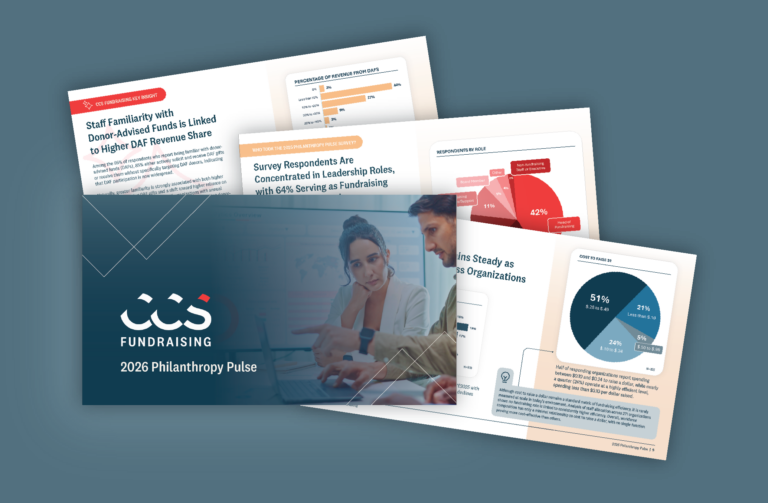On Friday, March 27, 2020, the Coronavirus Aid, Relief, and Economic Security (CARES) Act was signed into law. The $2 trillion economic stimulus bill aims to provide immediate relief for individuals, nonprofits, businesses, and state and local governments.
What Does This Mean for Nonprofit Organizations?
As it relates to fundraising, the CARES Act incentivizes charitable giving from individuals and corporations by increasing tax deductions for charitable donations. It also offers loans and grants to eligible nonprofit organizations impacted by the coronavirus. Below, please find a broad overview of the most impactful ways that the CARES Act affects donors and nonprofit organizations for tax year 2020.
Individual Donors:
- All taxpayers (both those who itemize and those who use standard deduction) can deduct $300 in charitable giving to public nonprofits in 2020
- Prior to the CARES Act, those who used standard deduction could not deduct any charitable giving.
- For those who itemize their taxes (which accounts for nearly all taxpayers with an income of $200,000+) the CARES Act significantly raises the amount of charitable giving deductible from 60% of filers’ adjusted gross income (AGI) to 100% of AGI.
- Gifts to donor-advised funds and private foundations do not receive the revised deductible under this provision.
Corporate Donors:
- The CARES Act raises the amount of charitable giving that corporations can deduct from 10% of taxable income to 25% of taxable income.
- The bill also raises the amount of in-kind donations of food that corporations can deduct from 15% of taxable income to 25% of taxable income.
Small Nonprofits (501(c)(3) or Veteran’s organizations 501(c)(19) with 500 employees or less):
Paycheck Protection Loan Program
- Organizations can receive a loan up to $10 million with a maximum interest rate of 4% to use for operating costs such as employee salaries, paid sick or medical leave, insurance premiums, and interest on mortgage, rent, and utility payments.
- The portion of the loan used for payroll costs, and interest on mortgage, rent, and utility payments during an 8-week period after the origination of the loan is eligible for loan forgiveness.
- Loan forgiveness may be reduced if staff headcount is reduced prior to June 30, 2020.
- Any loan portion that is not forgiven has a maximum maturity of 10 years.
- Loan payments can be deferred for 6-12 months.
Economic Injury Disaster Loan (EIDL) Program
- Eligible nonprofits can apply for a loan up to $2 million with a 2.75% interest rate, with a loan amount awarded based on the organization’s economic injury incurred from coronavirus.
- Loan repayment periods are up to 30 years based on the borrower’s ability to repay.
- Eligible organizations can request a $10,000 advance prior to receiving a loan, which does not require repayment even if organization is denied EIDL.
Large Nonprofits (Defined as Employing 500-10,000 Individuals):
- Organizations can apply for loans with a maximum interest rate of 2% to fund ongoing operations.
- Loan payments are not due within the first 6 months.
- To receive the loan, borrowers must certify that:
- The loan is necessary to support ongoing operations.
- The organization will retain 90% of its workforce until September 30, 2020.
- No jobs will be outsourced or offshored for a period ending two years after repayment of the loan.
Other Provisions to Note
Federal Grants:
- The bill provides an additional $25 million for the Kennedy Center in Washington, D.C., $75 million for the National Endowment for the Humanities, and $75 million for the National Endowment for the Arts.
- In 2018, the National Endowment for the Humanities and the National Endowment for the Arts awarded $152 million and $116 million respectively to nonprofits in the United States.
- Among other sectors receiving grants from the CARES Act, nearly $14 billion will be made available for higher education institutions to prevent, prepare for, and respond to coronavirus.
- Funds will be disbursed by the Department of Education through the Title IV distribution system.
- Funds may be used to defray expenses for colleges and universities, such as lost revenue, technology costs associated with a transition to distance education, and grants to students for food, housing, course materials, technology, health care, and child care.
Real Estate/Capital Gains Tax Change:
- The CARES Act includes a provision that allows real estate investors to use depreciation of real estate holdings to offset capital gains earnings, in effect lowering investors’ overall federal taxes.
- Previously, investors were only permitted to use real estate depreciations to offset $500,000 of capital gains annually. The CARES Act removes the $500,000 cap for three years (this year and 2018 and 2019 retroactively) which will potentially lower federal taxes by a considerable amount for some UHNW individuals, particularly real estate developers.
Additional Nonprofit Relief:
- The CARES Act creates a refundable payroll tax credit of up to $5,000 per employee on an eligible nonprofit’s payroll.
- To be eligible, a nonprofit must have experienced a drop in revenue of at least 50% in the first quarter of 2020 compared with to the organization’s revenue in first quarter of 2019.
- The credit is available each quarter until the nonprofit’s revenue exceeds 80% of the same quarter in 2019.
- Nonprofits receiving an Economic Injury Disaster Loan (EIDL) are not eligible for these credits.
- Nonprofits that self-fund unemployment benefits could be reimbursed for up to half of the costs of benefits provided to their laid-off employees.
- Suspending payment requirements for employers for the 6.2% employer portion of Social Security taxes from the date of enactment through the end of 2020, with half the balance due by the end of 2021, and the other half due by the end of 2022.
- Allowing net operating losses (NOLs) for nonprofits with UBIT, arising in tax years 2018, 2019 and 2020 to be carried back five years and suspending the 80% taxable income limit until 2021.
This piece has been prepared for informational purposes only and is not to be construed as tax advice. Individuals should consult their accountant or tax advisor with regard to such matters.
Sources Referenced:
- https://www.alliancebernstein.com/sites/library/donors-and-nonprofits-should-care-about-the-stimulus-bill.htm?seg=66
- “Coronavirus Aid, Relief, and Economic Security Act CARES Act (Pub. L. 116-132).” National Council of Nonprofits, 29 March 2020.
- Drucker, Jesse. “Bonanza for Rich Real Estate Investors, Tucked Into Stimulus Package.” The New York Times, The New York Times, 26 March 2020.
- “National Endowment for the Arts 2018 Annual Report.” Arts.gov, National Endowment for the Arts, 2019.
- “National Endowment for the Humanities Performance and Accountability Report Fiscal Year 2018.” Neh.gov, National Endowment for the Humanities, 2019.
- Parks, Dan. “Trump Signs Stimulus Bill Providing Nonprofit Loans, Grants, and ‘Universal Deduction’.” The Chronicle of Philanthropy, 26 March 2020.
- Tilton, Jay. “H.R. 748 The Coronavirus Aid, Relief, and Economic Security Act Title-By-Title Summary Prepared By The Office Of Vice Chairman Leahy (D-Vt.).” United States Senate Committee on Appropriations Vice Chairman Patrick Leahy, 25 March 2020.
To download or print this piece, click here.
During this challenging time, we are continuing to offer our perspectives and lessons learned from over seven decades of nonprofit advisory leadership. Click here to access our Strategies During COVID-19 page. Here you will find resources that provide best practices and optimal strategies to help your organization build a path through this crisis and beyond.
To access our full suite of perspectives, publications, and reports, visit our insights page. To learn more about CCS Fundraising’s suite of services, click here.






